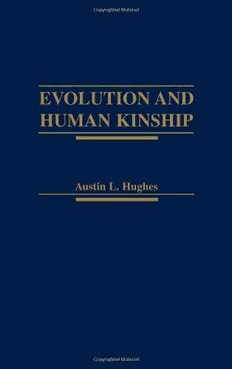
Evolution and Human Kinship PDF
175 Pages·1988·10.805 MB·English
Most books are stored in the elastic cloud where traffic is expensive. For this reason, we have a limit on daily download.
Preview Evolution and Human Kinship
Description:
While there have been controversial attempts to link conclusions from sociobiological studies of animal populations to humans, few behavioral scientists or anthropologists have made serious progress. In this work, Austin Hughes presents a unique and well-defined theoretical approach to human social behavior that is rooted in evolutionary biology and sociobiology, and which is additionally viewed as a direct continuation of the structural-functional tradition in anthropological research. Using mathematical and statistical techniques, Hughes applies the principles of kin selection theory--which states that natural selection can favor social acts that increase the fitness of both individuals and their relatives--to anthropological data. Among the topics covered are the subdivision of kin groups, selection of leaders in traditional societies, patronage systems, and the correspondence between social and biological kinship. The author concludes that patterns of concentration of relatedness are more important than average relatedness for predicting social behavior. He also shows that social interactions can often be predicted on the basis of common genetic interest in dependent offspring. The result is a major contribution to the field of behavioral biology.
See more
The list of books you might like
Most books are stored in the elastic cloud where traffic is expensive. For this reason, we have a limit on daily download.
